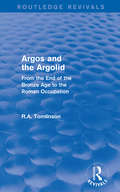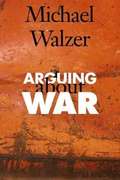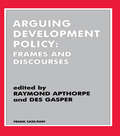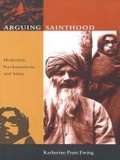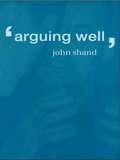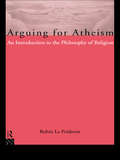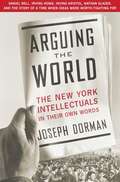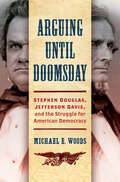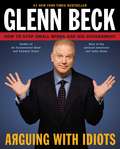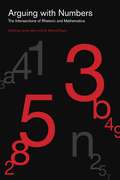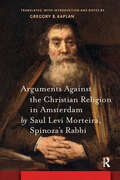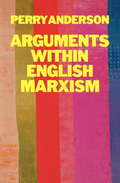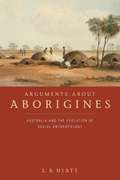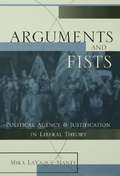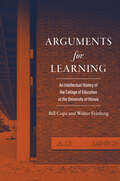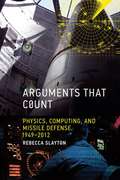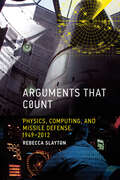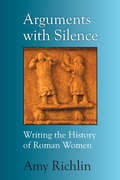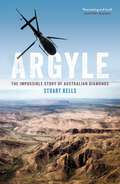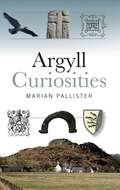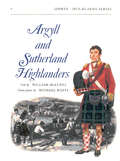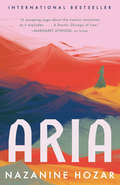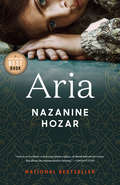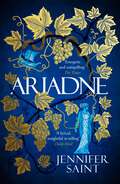- Table View
- List View
Argos and the Argolid: From the End of the Bronze Age to the Roman Occupation (Routledge Revivals)
by Richard A TomlinsonArgos and the Argolid, first published in 1972, presents a study of the history and achievements of the Argives, who have hitherto been largely neglected: partly because Classical Argos is overshadowed by the legends of an earlier millennium, and partly because many of her monuments and records have been lost. Richard Tomlinson describes the region, and considers the relationship between the Argives who claimed Dorian descent and those whose ancestors were in all probability the inhabitants of the region during the Bronze Age. In particular, he emphasises the Argives’ role as a ‘third force’ in mainland Greek history, where they challenged the supremacy of the Spartans in Peloponnesian affairs. This thorough treatment is intended to correct the usual bias in favour of the better documented affairs of Athens and Sparta. It includes an assessment of Argive military and political organisation, and of their contribution to the arts of Ancient Greece.
Arguing About War
by Michael WalzerMichael Walzer is one of the world's most eminent philosophers on the subject of war and ethics. Now, for the first time since his classic Just and Unjust Wars was published almost three decades ago, this volume brings together his most provocative arguments about contemporary military conflicts and the ethical issues they raise. The essays in the book are divided into three sections. The first deals with issues such as humanitarian intervention, emergency ethics, and terrorism. The second consists of Walzer's responses to particular wars, including the first Gulf War, Kosovo, Afghanistan, and Iraq. And the third presents an essay in which Walzer imagines a future in which war might play a less significant part in our lives. In his introduction, Walzer reveals how his thinking has changed over time. Written during a period of intense debate over the proper use of armed force, this book gets to the heart of difficult problems and argues persuasively for a moral perspective on war.
Arguing Development Policy: Frames and Discourses
by Des Gasper Raymond ApthorpeThis collection shows how policy discourses in the fields of national and international developments are constructed and operate and how they can be analysed. Dominant discourses screen out certain aspects: they frame' issues to include some matters and typically exclude important others. More generally, different policy discourses construct the world in distinctive ways, through language that requires deconstruction and careful review.
Arguing Sainthood: Modernity, Psychoanalysis, and Islam
by Katherine Pratt EwingIn Arguing Sainthood, Katherine Pratt Ewing examines Sufi religious meanings and practices in Pakistan and their relation to the Westernizing influences of modernity and the shaping of the postcolonial self. Using both anthropological fieldwork and psychoanalytic theory to critically reinterpret theories of subjectivity, Ewing examines the production of identity in the context of a complex social field of conflicting ideologies and interests.Ewing critiques Eurocentric cultural theorists and Orientalist discourse while also taking issue with expatriate postcolonial thinkers Homi Bhabha and Gayatri Spivak. She challenges the notion of a monolithic Islamic modernity in order to explore the lived realities of individuals, particularly those of Pakistani saints and their followers. By examining the continuities between current Sufi practices and earlier popular practices in the Muslim world, Ewing identifies in the Sufi tradition a reflexive, critical consciousness that has usually been associated with the modern subject. Drawing on her training in clinical and theoretical psychoanalysis as well as her anthropological fieldwork in Lahore, Pakistan, Ewing argues for the value of Lacan in anthropology as she provides the basis for retheorizing postcolonial studies.
Arguing Well
by John ShandArguing Well is a lucid introduction to the nature of good reasoning, how to test and construct successful arguments. It assumes no prior knowledge of logic or philosophy. The book includes an introduction to basic symbolic logic. Arguing Well introduces and explains: * The nature and importance of arguments * What to look for in deciding whether arguments succeed or fail * How to construct good arguments * How to make it more certain that we reason when we should The book is ideal for any student embarking on academic study where presenting arguments are what matters most; in fact, for all people who want to understand the nature and importance of good reasoning and awaken their ability to argue well.
Arguing for Atheism: An Introduction to the Philosophy of Religion
by Robin Le PoidevinFirst Published in 2004. Routledge is an imprint of Taylor & Francis, an informa company.
Arguing the World
by Joseph DormanFrom cafeterias to cocktail parties to the pages of influential journals of opinion, few groups of friends have argued ideas so passionately and so publicly as the writers and critics known as the New York intellectuals. A brilliantly contentious circle of thinkers, they wielded enormous influence in the second half of the twentieth century through their championing of cultural modernism and their critique of Soviet totalitarianism. Arguing the World is a portrait of four of the leading members of the group in their own words, based on the extensive interviews that formed the basis for Joseph Dorman's acclaimed film of the same name, which New York magazine named in 1999 as the Best New York Documentary. The political essayist Irving Kristol, the literary critic Irving Howe, and the sociologists Daniel Bell and Nathan Glazer are brought into sharp focus in a vivid account of one of the century's great intellectual communities. In this wide-ranging oral history, Dorman documents the lifelong political arguments of these men, from their working-class beginnings to their rise to prominence in the years following World War II, particularly through their contributions to magazines and journals like Partisan Review and Com-mentary. From the advent of the Cold War and McCarthyism, to the rise of the New Left on college campuses in the sixties, to the emergence of neoconservatism in the seventies and eighties, the group's disagreements grew more heated and at times more personal. Driven apart by their responses to these historic events, in later life the four found themselves increasingly at odds with one another. Kristol became influential in America's resurgent conservative movement and Glazer made a name for himself as a forceful critic of liberal social policy, while Bell fought to defend a besieged liberalism. Until his death in 1993, Irving Howe remained an unapologetic voice of the radical left. Weaving personal reminiscences from these towering figures with those of their friends and foes, Arguing the World opens a new window on the social and intellectual history of twentieth-century America.
Arguing until Doomsday: Stephen Douglas, Jefferson Davis, and the Struggle for American Democracy (Civil War America)
by Michael E. WoodsAs the sectional crisis gripped the United States, the rancor increasingly spread to the halls of Congress. Preston Brooks's frenzied assault on Charles Sumner was perhaps the most notorious evidence of the dangerous divide between proslavery Democrats and the new antislavery Republican Party. But as disunion loomed, rifts within the majority Democratic Party were every bit as consequential. And nowhere was the fracture more apparent than in the raging debates between Illinois's Stephen Douglas and Mississippi's Jefferson Davis. As leaders of the Democrats' northern and southern factions before the Civil War, their passionate conflict of words and ideas has been overshadowed by their opposition to Abraham Lincoln. But here, weaving together biography and political history, Michael E. Woods restores Davis and Douglas's fatefully entwined lives and careers to the center of the Civil War era. Operating on personal, partisan, and national levels, Woods traces the deep roots of Democrats' internal strife, with fault lines drawn around fundamental questions of property rights and majority rule. Neither belief in white supremacy nor expansionist zeal could reconcile Douglas and Davis's factions as their constituents formed their own lines in the proverbial soil of westward expansion. The first major reinterpretation of the Democratic Party's internal schism in more than a generation, Arguing until Doomsday shows how two leading antebellum politicians ultimately shattered their party and hastened the coming of the Civil War.
Arguing with Idiots
by Glenn Beck Kevin BalfeFUNNY. FRIGHTENING. TRUE. The #1 New York Times bestseller that gives you the right answers when idiots leave you speechless! It happens to all of us: You're minding your own business, when some idiot* informs you that guns are evil, the Prius will save the planet, or the rich have to finally start paying their fair share of taxes. Just go away! you think to yourself--but they only get more obnoxious. Your heart rate quickens. You start to sweat. But never fear, for Glenn Beck has stumbled upon the secret formula to winning arguments against people with big mouths and small minds: knowing the facts. And this book is full of them. The next time your Idiot Friends tell you how gun control prevents gun violence, you'll tell them all about England's handgun ban (see page 53). When they insist that we should copy the UK's health-care system, you'll recount the horrifying facts you read on page 244. And the next time you hear how produce prices will skyrocket without illegal workers, you'll have the perfect rebuttal (from page 139). Armed with the ultimate weapon--the truth--you can now tolerate (and who knows, maybe even enjoy?) your encounters with idiots everywhere! *Idiots can't be identified through voting records; look instead for people who hide behind stereotypes, embrace partisanship, and believe that bumper sticker slogans are a substitute for common sense.
Arguing with Numbers: The Intersections of Rhetoric and Mathematics (RSA Series in Transdisciplinary Rhetoric #16)
by James Wynn G. Mitchell ReyesAs discrete fields of inquiry, rhetoric and mathematics have long been considered antithetical to each other. That is, if mathematics explains or describes the phenomena it studies with certainty, persuasion is not needed. This volume calls into question the view that mathematics is free of rhetoric. Through nine studies of the intersections between these two disciplines, Arguing with Numbers shows that mathematics is in fact deeply rhetorical. Using rhetoric as a lens to analyze mathematically based arguments in public policy, political and economic theory, and even literature, the essays in this volume reveal how mathematics influences the values and beliefs with which we assess the world and make decisions and how our worldviews influence the kinds of mathematical instruments we construct and accept. In addition, contributors examine how concepts of rhetoric—such as analogy and visuality—have been employed in mathematical and scientific reasoning, including in the theorems of mathematical physicists and the geometrical diagramming of natural scientists. Challenging academic orthodoxy, these scholars reject a math-equals-truth reduction in favor of a more constructivist theory of mathematics as dynamic, evolving, and powerfully persuasive. By bringing these disparate lines of inquiry into conversation with one another, Arguing with Numbers provides inspiration to students, established scholars, and anyone inside or outside rhetorical studies who might be interested in exploring the intersections between the two disciplines.In addition to the editors, the contributors to this volume are Catherine Chaput, Crystal Broch Colombini, Nathan Crick, Michael Dreher, Jeanne Fahnestock, Andrew C. Jones, Joseph Little, and Edward Schiappa.
Arguing with Numbers: The Intersections of Rhetoric and Mathematics (RSA Series in Transdisciplinary Rhetoric)
by James Wynn G. Mitchell ReyesAs discrete fields of inquiry, rhetoric and mathematics have long been considered antithetical to each other. That is, if mathematics explains or describes the phenomena it studies with certainty, persuasion is not needed. This volume calls into question the view that mathematics is free of rhetoric. Through nine studies of the intersections between these two disciplines, Arguing with Numbers shows that mathematics is in fact deeply rhetorical. Using rhetoric as a lens to analyze mathematically based arguments in public policy, political and economic theory, and even literature, the essays in this volume reveal how mathematics influences the values and beliefs with which we assess the world and make decisions and how our worldviews influence the kinds of mathematical instruments we construct and accept. In addition, contributors examine how concepts of rhetoric—such as analogy and visuality—have been employed in mathematical and scientific reasoning, including in the theorems of mathematical physicists and the geometrical diagramming of natural scientists. Challenging academic orthodoxy, these scholars reject a math-equals-truth reduction in favor of a more constructivist theory of mathematics as dynamic, evolving, and powerfully persuasive. By bringing these disparate lines of inquiry into conversation with one another, Arguing with Numbers provides inspiration to students, established scholars, and anyone inside or outside rhetorical studies who might be interested in exploring the intersections between the two disciplines.In addition to the editors, the contributors to this volume are Catherine Chaput, Crystal Broch Colombini, Nathan Crick, Michael Dreher, Jeanne Fahnestock, Andrew C. Jones, Joseph Little, and Edward Schiappa.
Arguments Against the Christian Religion in Amsterdam by Saul Levi Morteira, Spinoza's Rabbi (Amsterdam Studies in the Dutch Golden Age)
by Gregory KaplanThis is the first book to offer a translation into English-as well as a critical study-of a Spanish treatise written around 1650 by Rabbi Saul Levi Morteira, whose most renowned congregant was Baruch Spinoza. Aimed at encouraging the practice of halachic Judaism among the Amsterdam-based descendants of conversos, Spanish and Portuguese Sephardic Jews who had been forced to convert to Christianity, the book stages a dialogue between two conversos that ultimately leads to a vision of a Jewish homeland-an outcome that Morteira thought was only possible through his program for rejudaisation.
Arguments Within English Marxism
by Perry AndersonThe characteristic form taken by English Marxism since the war has been the study of history. No writer exemplifies its achievements better than Edward Thompson, whose Making of the English Working Class is probably the most influential single work of historical scholarship by a socialist today. An editor of The New Reasoner in 1957–59, a founder of the New Left in 1960, now an eloquent champion of civil rights, Thompson has most recently aroused widespread interest with the appearance of his Poverty of Theory, which combines philosophical and political polemic with Louis Althusser, and powerful advocacy of the historian's craft. Arguments Within English Marxism is an assessment of its central theses that relates them to Thompson's major historical writings themselves. Thus the role of human agency—the part of the conscious choice and active will—in history is discussed through consideration of its treatment in The Making of the English Working Class. The problems of base and superstructure in historical materialism, and of affiliation to values in the past, are reviewed in the light of Whigs and Hunters. The claims of utopian imagination are illustrated from the findings of William Morris. Questions of socialist strategy are broached in part through the articles now collected in Writing by Candlelight. Exploring at once differences and convergences between New Left Review and one of its founders, the essay concludes by suggesting the virtues of diversity within a common socialist culture.
Arguments about Aborigines: Australia and the Evolution of Social Anthropology
by L. R. HiattIn the nineteenth century, Australian Aborigines were used by European scholars as an exemplar of early human forms, and have consequently featured as the crucial case study for generations of social theorists and anthropologists. Arguments about Aborigines examines controversial subjects such as family life, religion and ritual, and land rights through the prism of Aboriginal studies. Professor Hiatt's book will provide a valuable introduction to Aboriginal ethnography, and is a shrewd and stimulating history of the central questions in Aboriginal studies.
Arguments and Fists: Political Agency and Justification in Liberal Theory
by Mika LaVaque MantyFirst published in 2002. Routledge is an imprint of Taylor & Francis, an informa company.
Arguments for Learning: An Intellectual History of the College of Education at the University of Illinois
by Bill Cope Walter FeinbergAlmost every educational idea worth a thought has been considered at the University of Illinois, and anything worth trying has been tested. In this history of ideas, Bill Cope and Walter Feinberg chronicle the intellectual lives of education thinkers at the university while tracking the development of educational ideas and practices in general. Cope and Feinberg draw on conversations, narratives, and archival research that reveal how different generations explored their role in defining and carrying out the College’s multifaceted mission. Their account raises critical questions about the character of learning, the aims of teaching, and the nature of teaching as a profession. At the same time, the authors address issues that range from the role of schools in fostering individual and collective identity to the introduction of computer-mediated and online learning. Cope and Feinberg examine changes in self-understanding about fundamental ideas and chart how the College evolved from its original narrow mission of training children’s schoolteachers to embracing global perspectives. A wide-ranging portrait of an institution, Arguments for Learning uses the School of Education to tell the stories of thinkers dedicated to the idea that education can change the world for the better.
Arguments that Count
by Rebecca SlaytonIn a rapidly changing world, we rely upon experts to assess the promise and risks of new technology. But how do these experts make sense of a highly uncertain future? In Arguments that Count, Rebecca Slayton offers an important new perspective. Drawing on new historical documents and interviews as well as perspectives in science and technology studies, she provides an original account of how scientists came to terms with the unprecedented threat of nuclear-armed intercontinental ballistic missiles (ICBMs). She compares how two different professional communities -- physicists and computer scientists -- constructed arguments about the risks of missile defense, and how these arguments changed over time. Slayton shows that our understanding of technological risks is shaped by disciplinary repertoires -- the codified knowledge and mathematical rules that experts use to frame new challenges. And, significantly, a new repertoire can bring long-neglected risks into clear view. <P> In the 1950s, scientists recognized that high-speed computers would be needed to cope with the unprecedented speed of ICBMs. But the nation's elite science advisors had no way to analyze the risks of computers so used physics to assess what they could: radar and missile performance. Only decades later, after establishing computing as a science, were advisors able to analyze authoritatively the risks associated with complex software -- most notably, the risk of a catastrophic failure. As we continue to confront new threats, including that of cyber attack, Slayton offers valuable insight into how different kinds of expertise can limit or expand our capacity to address novel technological risks.
Arguments that Count: Physics, Computing, and Missile Defense, 1949-2012 (Inside Technology)
by Rebecca SlaytonHow differing assessments of risk by physicists and computer scientists have influenced public debate over nuclear defense.In a rapidly changing world, we rely upon experts to assess the promise and risks of new technology. But how do these experts make sense of a highly uncertain future? In Arguments that Count, Rebecca Slayton offers an important new perspective. Drawing on new historical documents and interviews as well as perspectives in science and technology studies, she provides an original account of how scientists came to terms with the unprecedented threat of nuclear-armed intercontinental ballistic missiles (ICBMs). She compares how two different professional communities—physicists and computer scientists—constructed arguments about the risks of missile defense, and how these arguments changed over time. Slayton shows that our understanding of technological risks is shaped by disciplinary repertoires—the codified knowledge and mathematical rules that experts use to frame new challenges. And, significantly, a new repertoire can bring long-neglected risks into clear view.In the 1950s, scientists recognized that high-speed computers would be needed to cope with the unprecedented speed of ICBMs. But the nation's elite science advisors had no way to analyze the risks of computers so used physics to assess what they could: radar and missile performance. Only decades later, after establishing computing as a science, were advisors able to analyze authoritatively the risks associated with complex software—most notably, the risk of a catastrophic failure. As we continue to confront new threats, including that of cyber attack, Slayton offers valuable insight into how different kinds of expertise can limit or expand our capacity to address novel technological risks.
Arguments with Silence: Writing the History of Roman Women
by Amy RichlinWomen in ancient Rome challenge the historian. Widely represented in literature and art, they rarely speak for themselves. Amy Richlin, among the foremost pioneers in ancient studies, gives voice to these women through scholarship that scours sources from high art to gutter invective. In Arguments with Silence, Richlin presents a linked selection of her essays on Roman women's history, originally published between 1981 and 2001 as the field of "women in antiquity" took shape, and here substantially rewritten and updated. The new introduction to the volume lays out the historical methodologies these essays developed, places this process in its own historical setting, and reviews work on Roman women since 2001, along with persistent silences. Individual chapter introductions locate each piece in the social context of Second Wave feminism in Classics and the academy, explaining why each mattered as an intervention then and still does now. Inhabiting these pages are the women whose lives were shaped by great art, dirty jokes, slavery, and the definition of adultery as a wife's crime; Julia, Augustus' daughter, who died, as her daughter would, exiled to a desert island; women wearing makeup, safeguarding babies with amulets, practicing their religion at home and in public ceremonies; the satirist Sulpicia, flaunting her sexuality; and the praefica, leading the lament for the dead. Amy Richlin is one of a small handful of modern thinkers in a position to consider these questions, and this guided journey with her brings surprise, delight, and entertainment, as well as a fresh look at important questions.
Argyle: The Impossible Story of Australian Diamonds
by Stuart KellsThe remote Kimberley region of Western Australia has a rich history and unique geography. In the 1960s De Beers, the world's largest diamond company, sent gem-hunters to the area but they came away empty-handed. It was a vast region to survey, and they'd overlooked something vital. A few years later, a team of Australian geologists with a tiny budget searched for even tinier mineral clues. Those clues led them to the earth's largest diamond deposit and the world's richest source of rare pink diamonds. Based on in-depth research and interviews - including with Alan King Jones, Bill Leslie and 'the father of Australian diamonds', Ewen Tyler - Argyle: The Impossible Story of Australian Diamonds details the almost overwhelming challenges with realising a diamond mining venture in Australia, shows how these obstacles were overcome, and explores the mine's impact and legacy.
Argyll Curiosities
by Marian PallisterThe author of Lost Argyll offers an illustrated journey through the local lore and hidden histories of this curious county in the southwest of Scotland. The great travelers of the 17th century used the word &“curiosity&” in reference to many different things. The label was equally applied to people, plants, legends, historical facts and geological certainties. In Argyll Curiosities, Scottish author Marian Pallister follows their example in a 21st century journey around Argyll and its islands. It is difficult to find an area of Argyll which is not curious in some way: archaeology, geography, geology and genealogy have all revealed the uniqueness of this western fringe of Scotland. Going beyond the curiosities that are easily found on any journey through the county, Pallister has looked extensively into places, people and events which are curiously layered, resulting in a book that is overflowing with enchanting revelations and local histories.
Argyll and Sutherland Highlanders
by Michael Roffe William McelweeOn 1 July 1881 Viscount Cardwell's wholesale reorganisation of the British Army brought into existence Priness Louise's Argyll and Sutherland Highlanders. Both had existed as separate regiments even before their official incorporation into the British Army and on the face of it, this seemed a highly improbable union, Being separated both geographically and historically - they had never even served together in the same theatre. Yet, as history has shown, this unlikely combination proved to be a tremendous success. William McElwee tells the story of this most famous of regiments which has served with distinction in World War I (1914-1918), World War II (1939-1945), and beyond.
Aria: A Novel
by Nazanine HozarAn extraordinary, cinematic saga of rags-to-riches-to-revolution that follows an orphan girl coming of age in Iran at a time of dramatic upheaval It is the 1950s in a restless Iran, a country rich in oil but deeply divided by class and religion. The government is unpopular and corrupt and under foreign sway. One night, an illiterate army driver hears the pitiful cry of a baby abandoned in an alley and menaced by ravenous wild dogs. He snatches up the child and takes her home, naming her Aria—the first step on an unlikely path from deprivation to privilege. Over the next two decades, the orphan girl acquires three mother figures whose secrets she will learn only much later: reckless and self-absorbed Zahra, who abuses her; wealthy and compassionate Fereshteh, who adopts her; and mysterious Mehri, whose connection to Aria is both a blessing and a burden. A university education opens a new world to Aria, and she is soon caught up in the excitement and danger of the popular uprising against the Shah that sweeps through the streets of Tehran. The novel&’s heart-pounding, explosive finale sees the Ayatollah Khomeini&’s brutal regime seize power—even as Aria falls in love and becomes a mother herself. Nazanine Hozar&’s stunning debut gives us an unusually intimate view of a momentous time, through the eyes of a young woman coming to terms with the mysteries of her own past and future.
Aria: A Novel
by Nazanine HozarThis extraordinary, gripping debut is a rags-to-riches-to-revolution tale about an orphan girl's coming of age in Iran."Aria is a feminist odyssey, about a girl in a time of intolerance as the revolution in Iran is breaking out . . . a poised and dramatic historical novel with contemporary relevance." --John Irving"Here comes a sweeping saga about the Iranian revolution as it explodes--told from the ground level and the centre of chaos. A Doctor Zhivago of Iran." --Margaret Atwood (on Twitter)It is the early 1950s in a restless Iran, a country powerful with oil wealth but unsettled by class and religious divides and by a larger world hungry for its resources. One night, a humble driver in the Iranian army is walking home through a neighbourhood in Tehran when he hears a small, pitiful cry. Curious, he searches for the source, and to his horror comes upon a newborn baby girl abandoned by the side of the road and encircled by ravenous dogs. He snatches up the child, and forever alters his own destiny and that of the little girl, whom he names Aria.Nazanine Hozar's stunning debut takes us inside the Iranian revolution--but seen like never before, through the eyes of an orphan girl. Through Aria, we meet three very different women who are fated to mother the lost child: reckless and self-absorbed Zahra, wife of the kind-hearted soldier; wealthy and compassionate Fereshteh, who welcomes Aria into her home, adopting her as an heir; and finally, the mysterious, impoverished Mehri, whose connection to Aria is both a blessing and a burden. The novel's heart-pounding conclusion takes us through the brutal revolution that installs the Ayatollah Khomeini as Iran's supreme leader, even as Aria falls in love and becomes a young mother herself.
Ariadne: The Mesmerising Sunday Times Bestselling Retelling of Ancient Greek Myth
by Jennifer SaintA mesmerising retelling of the ancient Greek myth of Theseus and the Minotaur. Perfect for fans of CIRCE, A SONG OF ACHILLES, and THE SILENCE OF THE GIRLS.'ARIADNE gives voice to the misused Princess of Crete who betrayed her father to save Theseus from the Minotaur. Relevant and revelatory.' - StylistAs Princesses of Crete and daughters of the fearsome King Minos, Ariadne and her sister Phaedra grow up hearing the hoofbeats and bellows of the Minotaur echo from the Labyrinth beneath the palace. The Minotaur - Minos's greatest shame and Ariadne's brother - demands blood every year. When Theseus, Prince of Athens, arrives in Crete as a sacrifice to the beast, Ariadne falls in love with him. But helping Theseus kill the monster means betraying her family and country, and Ariadne knows only too well that in a world ruled by mercurial gods - drawing their attention can cost you everything. In a world where women are nothing more than the pawns of powerful men, will Ariadne's decision to betray Crete for Theseus ensure her happy ending? Or will she find herself sacrificed for her lover's ambition?ARIADNE gives a voice to the forgotten women of one of the most famous Greek myths, and speaks to their strength in the face of angry, petulant Gods. Beautifully written and completely immersive, this is an exceptional debut novel.Praise for Jennifer Saint and ARIADNE:'Exquisitely written and exceptionally moving, this is a mythical retelling to savour.' - Elodie Harper, author of THE WOLF DEN'With her wonderfully executed debut that reimagines the classic tale of Theseus, Adriane and the Minotaur, Jennifer Saint joins the likes of Madeline Miller and Pat Barker in forging mesmerising retellings of ancient Greek myths from a female perspective.' - Waterstones.com'Saint's immersive novel thrusts the reader straight into the heart of Greek mythology with this wonderful reimagining of the story of Ariadne.' - iPaper'What happens after the monster is defeated and the princess leaves with the hero? Jennifer Saint's ARIADNE is a shimmering tapestry of two sisters bound by deceit and the shadows of family history. . .With a fresh voice and keen insight, Saint adds flesh and bone to an ancient myth, drawing the reader into an uneasy world of ever-afters.' - Yangsze Choo, New York Times bestselling author of THE NIGHT TIGER
